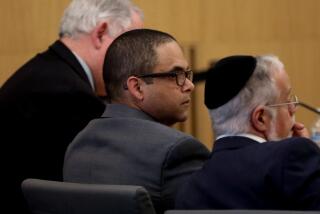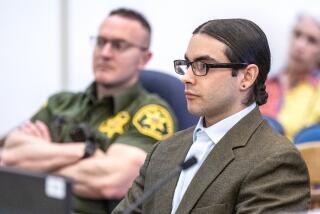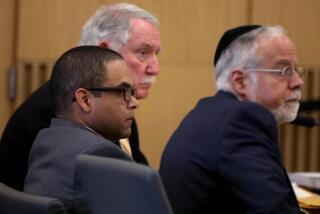Split verdict in Florida loud-music slaying case
A jury in Florida returned a split verdict in the case of Michael Dunn, accused of killing an unarmed teenager in a dispute over loud music — a decision that will put the software engineer in prison for the rest of his life but leaves unanswered lingering questions about race, guns and self-defense law.
In its fourth day of deliberation Saturday, the jury convicted Dunn, 47, of four charges. But the jury, which included two African American women, one Latino man, an Asian American woman and eight white people, couldn’t reach a decision on the charge of first-degree murder in the killing of Jordan Davis, who would have celebrated his 19th birthday Sunday.
Dunn, who is white, fired 10 shots at an SUV, killing Davis, then 17, who was black, after a dispute in a convenience store parking lot in Jacksonville on Nov. 23, 2012.
Three friends of Davis who were also in the vehicle were uninjured in the shooting, which came after Dunn asked them to turn down the volume on their rap music. Dunn contended he acted in self-defense, while prosecutors suggested that Dunn was angry because he was being disrespected by a young black man.
Dunn was charged with first-degree murder, three counts of attempted second-degree murder and one count of firing into a vehicle. The jury deadlocked on the first-degree murder charge, but convicted him on the other four.
Dunn appeared impassive as the verdicts were read, then was turned over to authorities to await sentencing. He faces at least 60 and up to 75 years in prison when he is sentenced in March.
The proceedings were the latest in a series of murder cases with claims of self-defense that have roiled Florida and garnered national attention. George Zimmerman, who identifies as Latino, was acquitted of murdering an unarmed black teenager, Trayvon Martin, during a confrontation in February 2012. Another case, involving a former police captain accused of killing a man in a movie theater after a dispute over texting, is working its way through the courts.
For Davis’ family, the mixed verdict was a mixed blessing.
“It’s been a long, long road and we’re so happy to have just a little bit of closure,” Lucia McBath, Davis’ mother, said at a televised news conference after the verdict. She said she would pray for Dunn and has asked her family to pray for him as well. “It’s sad for Mr. Dunn that he will live the rest of his life in that sense of torment,” she said.
McBath and the slain teen’s father, Ron Davis, have been lobbying against gun violence since their son’s death. Davis thanked supporters while expressing disappointment that jurors failed to reach a verdict about the death of his son. “We don’t accept a law that will allow collateral damage to our family members,” he said.
For prosecutors, many of whom were also involved in the Zimmerman case, Saturday’s verdict was a vindication of sorts. State Atty. Angela Corey, whose office was the special prosecutor in the Zimmerman case, said she was proud of the prosecution. On the murder charge, Corey said she would probably press for a new trial in Duval County.
Defense attorney Cory Strolla, at his post-verdict news conference, said an appeal was a possibility. “I wish I could have done something different,” he told reporters. “But to be honest, I have no earthly clue what I could have done.”
He called the time the jury spent deliberating, about 30 hours, “the most stressful” of his life.
The sequestered jury began deliberations Wednesday. That Dunn had fired into the SUV and killed Davis was never in question. As in the Zimmerman case, race has been a subtext in the trial. Prosecutors maintained that Dunn shot at the black teenagers because they were playing their hip-hop music too loudly.
But Strolla pressed the self-defense claim.
Florida’s “stand your ground” law allows the defense to seek a special hearing to receive immunity from prosecution before a trial. Dunn did not choose to go that route — a point made by prosecutor Corey after the verdict. Dunn said he fired only when he saw Davis wielding a weapon from inside the Dodge Durango SUV and felt threatened.
Police didn’t find a weapon in the SUV, but the defense contended that the teens could have gotten rid of it.
In his testimony, Dunn told jurors he was in Jacksonville with his fiancee, Rhonda Rouer, to attend his son’s wedding. Dunn said he and Rouer went to the convenience store for wine and chips, and he pulled in next to the SUV.
“My rear-view mirror was shaking. My eardrums were vibrating. It was ridiculously loud,” Dunn said last week during testimony.
Dunn said he asked the teenagers to turn down the music, which they did. But the volume soon rose again. Dunn said he heard someone in the car use a derogatory term for whites in the South, and described the teens as having “menacing expressions.”
The situation quickly escalated into an expletive-laden confrontation. One of the teens stepped out of the SUV, Dunn said, and he felt “this was a clear and present danger.” Prosecutors disputed that anyone ever left the vehicle.
Dunn reached for a 9-millimeter pistol in his glove compartment and fired nine shots in two volleys into the SUV. A 10th shot missed the vehicle.
After the shooting, Dunn said, he drove away with Rouer and his dog. The couple went back to their hotel, had pizza and walked the dog. Dunn testified that he didn’t call the police because his focus was on Rouer, who he said was in hysterics. The next morning, Rouer wanted to go home and they drove to Brevard County, 175 miles away.
Dunn, who said he learned of Davis’ death after leaving the scene, said he contacted a neighbor who works in law enforcement for advice on how to turn himself in.
Rouer testified that Dunn never told her about seeing a gun, a point that prosecutor John Guy emphasized in his cross-examination of Dunn. “You never told the love of your life that those guys had a gun,” Guy said. “Did you?”
Dunn responded, “You were not there.”
“Jordan Davis didn’t have a weapon. He had a big mouth,” Guy said in his summation to the jury Wednesday. “That man wasn’t going to stand for it, and it cost Jordan Davis his life.”
More to Read
Start your day right
Sign up for Essential California for news, features and recommendations from the L.A. Times and beyond in your inbox six days a week.
You may occasionally receive promotional content from the Los Angeles Times.







